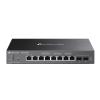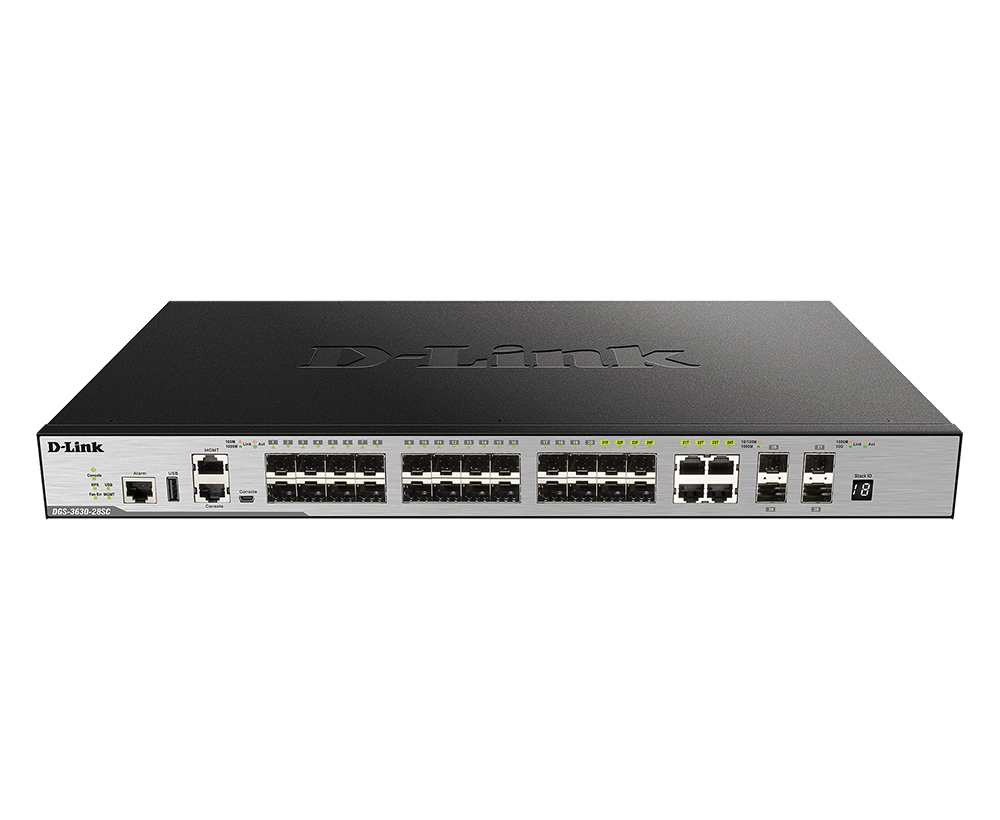-
Kč
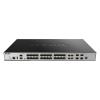
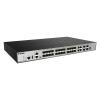
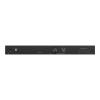
The DGS-3630 Series Gigabit L3 Stackable Managed Switches are designed for Small to Medium-sized Businesses (SMBs), Small to Medium-sized Enterprises (SMEs), large enterprises, and Internet Service Providers (ISPs). They deliver high performance, flexibility, fault tolerance, and advanced software features for maximum return on investment. With Gigabit Ethernet, SFP, 10 GbE SFP+, security features, and advanced Quality of Service (QoS), the DGS-3630 Series can act as core, distribution or access layer switches. High port densities, switch stacking, and easy management make the DGS-3630 Series suitable for a variety of applications.
Standard, Enhanced, and MPLS Images
The DGS-3630 Series is designed for use with three different software images: the Standard Image (SI), the Enhanced Image (EI), and the MPLS Image (MI). The Standard Image provides core SMB and SME functionality such as L2 switching, entry-level routing, L2 multicast, advanced QoS, Operations, Administration, and Maintenance (OAM), and robust security features. The Enhanced Image supports all the features of the Standard Image in addition to full L3 routing for enterprise integration, including OSPF, BGP, VRF-Lite and L3 multicast. The MPLS Image offers all the features of the Standard and Enhanced Images in addition to VPN services for ISPs, including IS-IS and MPLS L2/L3 VPN. With multiple software images, only the required features need to be installed, providing a flexible approach to software management. The product has Standard Image software.
High Availability and Flexibility
The DGS-3630 Series allows multiple switches to be combined to form a single physical2 or virtual stack. This increases redundancy over multiple physical units, simplifies management, and provides a single IP address to manage all members in the stack. Up to 9 switches can be combined using DACs to make up to 432 Gigabit Ethernet ports available, allowing switching capacity to be increased with demand. The Switch Resource Management (SRM) feature allows the hardware table size to be dynamically changed, so that switch functions can be optimised based on the use of the switch. There are 3 modes: IP Mode, LAN Mode, and L2 VPN Mode. These modes modify the size of the Layer 2 and 3 tables for optimum efficiency.
Switch and Link Failover
In addition to traditional Spanning Tree Protocol (STP), Rapid Spanning Tree Protocol (RSTP), and Multiple Spanning Tree Protocol (MSTP), the DGS-3630 Series also supports advanced Ethernet failover redundancy technologies, such as ERPS and FlexLink. Ethernet Ring Protection Switching (ERPS) provides millisecond-level failover in a ring topology. Meanwhile, FlexLink offers link failover on designated switch ports, providing link redundancy without STP or LBD.
Security, Performance, and Availability
The DGS-3630 Series provides a complete set of security features including multi-layer Access Control Lists (ACLs) and 802.1X user authentication via TACACS+ and RADIUS. The DGS-3630 Series also offers extensive VLAN support, including GVRP and 802.1Q VLAN to enhance security and performance. A robust set of QoS features help ensure that critical network services such as Voice over IP and video conferences are given high priority through the network. The D-Link Safeguard Engine increases the switches’ reliability, serviceability, and availability by preventing traffic flooding caused by malicious attacks.
Versatile Management
The DGS-3630 Series provides the D-Link Network Assistant Utility, an industry-standard CLI, and an intuitive web-based management interface that enables administrators to set up and remotely manage their networks. Support for SNMP allows centralised management of a large number of devices and out-of-band management is available via a dedicated console port. A mini-USB console port allows the DGS-3630 Series to be managed without any extra connectors, and a USB Type A port can be used to connect a storage device to store logs, configuration settings, and firmware images. The DHCP auto-configuration and auto-image features enable deployment of multiple switches automatically, saving costs for mass deployment. The DGS-3630 Series furthermore supports OpenFlow 1.3, allowing the switches to be managed using an OpenFlow controller.
6 kV Surge Protection
The DGS-3630 Series features built-in 6 kV surge protection on all Ethernet access ports. This effectively protects the switches against sudden electrical surges caused events such as lightning strikes or unstable electrical current. Built-in 6 kV surge protection significantly reduces the chances of equipment being damaged by electrical surges and effectively lowers maintenance costs by minimising the need for expensive equipment repairs or replacement.
D-Link Green Technology
The DGS-3630 Series features D-Link Green technology, which includes a power-saving mode, smart fan feature, reduced heat dissipation, and cable length detection. The power-saving feature automatically powers down ports that have no link or link partner and ensures that LEDs are shut off when not needed. The smart fan3 feature enables the built-in fans to automatically activate above a certain temperature threshold, providing continuous, reliable, and eco-friendly operation of the switch.
Features
High Availability and Flexibility
- 20 SFP ports
- 4 Combo 10/100/1000BASE-T/SFP ports
- 4 10 GbE SFP+ uplink ports
- Switch Resource Management (SRM) for flexible management of system resources
- 6 kV surge protection on all RJ-45 access ports
Reliability
- Redundant Power Supply (RPS) support
- IEEE 802.1D/802.1w/802.1s Spanning Tree
- Loopback Detection (LBD)
- Ethernet Ring Protection Switching (ERPS)
High Bandwidth Stacking
- Physical stack of up to 9 units, 432 GbE ports
- Supports long-distance stacking over fiber
- 80 Gbps per device physical stacking bandwidth
Operations, Administration, and Maintenance
- IEEE 802.3ah Ethernet Link OAM
- IEEE 802.1ag/ITU-T Y.1731 Service OAM
Easy Management
- RJ-45/mini-USB console port
- Management and alarm ports
- USB port for firmware and configuration files
- Easy-to-use web GUI and industry-standard CLI
Specifications
| DGS-3630-28SC/SI | |
| General | |
|---|---|
| Size | 19-inch, 1U rack-mount size |
| Interfaces |
20 x 10/100/1000BASE-T ports 4 x Combo 10/100/1000BASE-T/SFP ports 4 x 10 GbE SFP+ ports |
| Console Port | RJ-45 and Mini-USB console ports for out-of-band CLI management |
| Management Port | 10/100/1000BASE-T RJ-45 Ethernet port for out-of-band IP management |
| Alarm Port | 1 x RJ-45 port |
| USB Port | 1 x USB 2.0 Type A port |
| Performance | |
| Switching Capacity | 128 Gb/s |
| Packet Forwarding Rate | 95,24 Mp/s |
| Packet Buffer | 4 MB |
| MAC Address Table | 68K |
| IPv4 Routing Table (IPv4 / IPv6) |
IPv4: 16K IPv6: 7K |
| IPv4 Forwarding Table (IPv4 / IPv6) |
IPv4: 32K IPv6: 16K |
| Jumbo Frame Size | 12 K |
| Physical | |
| MTBF | 280,612.09 hours |
| Acoustics | 56 dB(A) |
| Heat Dissipation | 216.81 BTU/h |
| Power Input |
100 - 240 V AC 50/60 Hz |
| Maximum Power Consumption | 63,58 W |
| Standby Power Consumption | 30,1 W |
| Dimensions | 441 x 259,8 x 44 mm |
| Weight | 3,76 kg |
| Ventilation |
2 x smart fans |
| Operating Temperature | -5 to 50 °C (23 to 122 °F) |
| Storage Temperature | -40 to 70 °C (-40 to 158 °F) |
| Operating Humidity | 10% to 95% RH |
|
Storage Humidity |
5% to 95% RH |
| Surge Protection | 6 kV surge protection on all Ethernet access ports |
| Safety Certifications | cUL, CB, CE, CCC, BSMI |
| EMI / EMC | CE, FCC Class A, C-Tick, VCCI, BSMI, CCC |
| Software features | |
| Stackability |
Physical stacking
Virtual stacking/clustering of up to 32 units
|
| L2 Features |
MAC Address Table : up to 68K entries Flow Control
Spanning Tree Protocol
Jumbo Frame: up to 12 KBytes 802.1AX Link Aggregation
ERPS (Ethernet Ring Protection Switching) version 2 Port Mirroring
Flow Mirroring
VLAN Mirroring RSPAN L2 Protocol Tunneling Multi-Chassis Link Aggregation Group (MLAG) |
| VLAN |
802.1Q 802.1v Protocol-based VLAN Double VLAN (Q-in-Q)
Port-based VLAN MAC-based VLAN Subnet-based VLAN Private VLAN VLAN Group
Multicast VLAN (ISM VLAN for IPv4/IPv6) Voice VLAN Auto Surveillance VLAN VLAN Trunking GVRP: Up to 4K dynamic VLANs Asymmetric VLAN |
| L2 Multicast |
MLD Snooping
IGMP Snooping
PIM Snooping |
| L3 Features |
IPv4 ARP/IPv6 ND: support up to 32K/16K
Gratuitous ARP IP Interface
Loopback Interface Proxy ARP
IPv6 Tunneling
VRRP v2/v3 IP Helper |
| L3 Routing |
Supports 16K hardware routing entries shared by IPv4/IPv6
Supports up to 32K hardware L3 forwarding entries shared by IPv4/IPv64
Static Route
IPv4/IPv6 Default Route PBR (Policy-based Route) Null Route Route Preference Route Redistribution Graceful Restart (GR) Helper BFD (Bidirectional Forwarding Detection)
RIPv1/v2/ng |
| L3 Multicast | IGMP/MLD Filtering |
| QoS (Quality of Service) |
802.1p 8 queues per port Queue Handling
Congestion Control
802.1Qbb Priority-based Flow Control (PFC) for 10 GbE port Bandwidth Control
Policy Map
CoS based on:
Three Color Marker
|
| ACL (Access Control List) |
ACL based on:
Max. ACL entries:
Time-based ACL |
| Green |
Energy-Efficient Ethernet (EEE) Power saving by link status Power saving by cable length Time-based PoE (PoE models only) Power saving by LED shut-off Power saving by port shut-off Power saving by system hibernation |
| Security |
Port Security
Broadcast/Multicast/Unicast Storm Control D-Link Safeguard Engine DHCP Server Screening Dynamic ARP Inspection IP Source Guard DHCP Snooping IPv6 Snooping Dynamic ARP Inspection (DAI) DHCPv6 Guard IPv6 Route Advertisement (RA) Guard IPv6 ND Inspection Duplicate Address Detection (DAD) ARP Spoofing Prevention
L3 Control Packet Filtering Unicast Reverse Path Forwarding (URPF) Traffic Segmentation SSL
SSH
BPDU Attack Prevention DOS Attack Prevention NetBIOS/NetBEUI filtering |
| AAA |
802.1X Authentication
Web-based Access Control (WAC)
MAC-based Access Control (MAC)
Guest VLAN Microsoft® NAP
Privilege Level for Management Access RAIDUS and TACACS+ Authentication Authentication Database Failover RADIUS/TACACS+ Accounting |
| OAM |
Cable Diagnostics 802.3ah Ethernet Link OAM D-Link Unidirectional Link Detection (DULD) Dying Gasp 802.1ag Connectivity Fault Management (CFM) Y.1731 OAM Optical Transceiver Digital Diagnostic Monitoring (DDM) |
| Management |
NTPv3/v4 Precision Time Protocol (PTP) Web-based GUI
Command Line Interface (CLI) Telnet Server for IPv4/IPv6 access Telnet Client for IPv4/IPv6 SNMP Support v1/v2c/v3 Support IPv4/IPv6 access SNMP Trap TFTP Client for IPv4/IPv6 FTP Client for IPv4/IPv6 IPv4 SFTP Server RCP System Log for IPv4/IPv6 Syslog Server SMTP RMONv1
RMONv2
OpenFlow
Command Logging LLDP/LLDP-MED D-Link Discover Protocol (DDP) DHCP Client option 12 DHCP Auto-configuration DHCP Auto-image DHCP Relay option 60/61/62/18/37/125 DHCP/DHCPv6 Local Relay DHCP Server
DHCPv6 Prefix Delegation (PD) Multiple Images/ Multiple Configurations DNS Relay for IPv4/IPv6 DNS Client for IPv4/IPv6 Debug Command Password recovery/ encryption Ping/ Traceroute for IPv4/IPv6 Microsoft® Network Load Balancing (NLB) Switch Resource Management (SRM) sFlow D-Link License Management System (DLMS) |






 Polski
Polski English
English Italiano
Italiano Español
Español Čeština
Čeština Српски
Српски Deutsch
Deutsch Ελληνικά
Ελληνικά Slovenský
Slovenský

